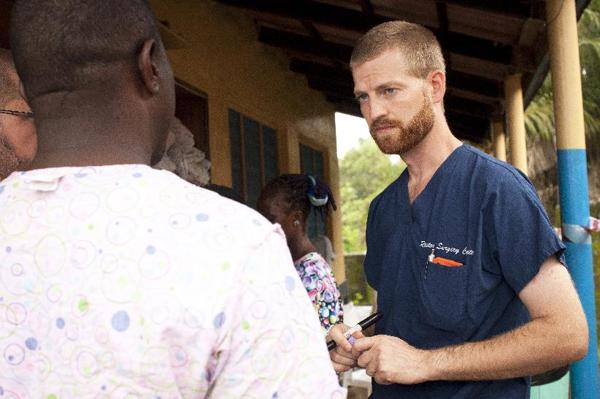他们承受风险,始终坚持。他们牺牲自我,拯救他人。《时代》主编Nancy Gibbs亲述:为何埃博拉医护人员(Ebola Fighters)被选为2014年度人物。
加入1000位小伙伴,阅读更多精彩英语文章,学习Will老师原创美语口语语音课程,欢迎订阅优秀的微信学英语公众号:WillsEnglishCourse
They risked and persisted, sacrificed and saved. Editor Nancy Gibbs explains why the Ebola Fighters are TIME’s choice for Person of the Year 2014…
Not the glittering weapon fights the fight, says the proverb, but rather the hero’s heart.
有句格言是这么说的:在战场上浴血奋战的不是那些明晃晃的武器,而是英雄的心。
Maybe this is true in any battle; it is surely true of a war that is waged with bleach and a prayer.
这句话也许适用于任何战争。对于一场依赖于消毒剂和祈祷的战争而言,尤为正确。
版权声明:如无特别说明,本站所有文章均由Will的美语课(Learnenglishwithwill.com)原创。本站欢迎少量文字引用,但请注明出处。任何网站或个人,未经授权,不得抄袭、转载、盗用本站内容,违者必究。
For decades, Ebola haunted rural African villages like some mythic monster that every few years rose to demand a human sacrifice and then returned to its cave. It reached the West only in nightmare form, a Hollywood horror that makes eyes bleed and organs dissolve and doctors despair because they have no cure.
数十年来,埃博拉病毒像某种神秘的恶魔般纠缠着偏远的非洲村落。它每隔几年就会出没,索取人类性命作为祭品,再返回巢穴。在西方人看来,它更像是噩梦。像好莱坞的恐怖片般,能使双眼流血,器官溶解,令医生绝望。因为他们没有解药。
But 2014 is the year an outbreak turned into an epidemic, powered by the very progress that has paved roads and raised cities and lifted millions out of poverty. This time it reached crowded slums in Liberia, Guinea and Sierra Leone; it traveled to Nigeria and Mali, to Spain, Germany and the U.S. It struck doctors and nurses in unprecedented numbers, wiping out a public-health infrastructure that was weak in the first place. One August day in Liberia, six pregnant women lost their babies when hospitals couldn’t admit them for complications. Anyone willing to treat Ebola victims ran the risk of becoming one.
然而,2014年却是病毒由爆发变为大流行的一年。随着社会的进步,人们能够修筑道路,兴建城市,数百万人脱离贫困,却也使得病毒更易流行。这一次,病毒侵袭了利比里亚、几内亚、塞拉利昂拥挤的贫民窟;抵达了尼日利亚和马里,西班牙、德国、美国。病毒感染了大量医生、护士,夷平了一家脆弱的公共健康机构。利比里亚八月的1天内,6名怀孕妇女失去了自己的宝宝,因为医院担心埃博拉并发症而不敢让其入院。任何愿意诊治埃博拉病人的人,自己也面临成为埃博拉病人的风险。
Which brings us to the hero’s heart. There was little to stop the disease from spreading further. Governments weren’t equipped to respond; the World Health Organization was in denial and snarled in red tape. First responders were accused of crying wolf, even as the danger grew. But the people in the field, the special forces of Doctors Without Borders/Médecins Sans Frontières (MSF), the Christian medical-relief workers of Samaritan’s Purse and many others from all over the world fought side by side with local doctors and nurses, ambulance drivers and burial teams.
而这,带我们见证了英雄之心。没有什么办法能阻止疾病进一步扩散。政府束手无策;世卫组织拒绝接受现实,并受制于各类繁琐流程。即便当危险正在蔓延时,先觉者们被指责是在空穴来风。但那些身处一线的人们,那些来自无国界医生组织(MSF)的特派人员,来自撒玛利亚人组织的基督教医疗救援工作者,以及许许多多来自全世界的人们,与当地的医护人员、救护车司机、殡葬团队们一起,并肩作战。
Ask what drove them and some talk about God; some about country; some about the instinct to run into the fire, not away. “If someone from America comes to help my people, and someone from Uganda,” says Iris Martor, a Liberian nurse, “then why can’t I?” Foday Gallah, an ambulance driver who survived infection, calls his immunity a holy gift. “I want to give my blood so a lot of people can be saved,” he says. “I am going to fight Ebola with all of my might.”
当问及是什么驱使他们这么做时,他们有些人说是上帝;有些人说是国家;有些人说是源于冲入火场施救,而非逃开的本能。“如果连素不相识的美国人都赶来对我们、以及乌干达人施以援手,”利比里亚护士Iris Martor说:“那我为什么不这么做?”一位在感染中幸存的救护车司机Foday Gallah,将其免疫力视为上天的馈赠。“我愿意献出自己的鲜血,以救助更多的人”,他说:“我将全力以赴,与埃博拉抗争。”
MSF nurse’s assistant Salome Karwah stayed at the bedsides of patients, bathing and feeding them, even after losing both her parents—who ran a medical clinic—in a single week and surviving Ebola herself. “It looked like God gave me a second chance to help others,” she says. Tiny children watched their families die, and no one could so much as hug them, because hugs could kill. “You see people facing death without their loved ones, only with people in space suits,” says MSF president Dr. Joanne Liu. “You should not die alone with space-suit men.”
MSF的护士助理Salome Karwah守护在病人的床头,为他们擦身、喂食,即使她开医疗诊所的父母在一周内相继去世,仅剩她幸存。“我觉得是上帝给我第二次机会去帮助他人。”她说。幼小的孩子们眼睁睁看着自己的家人死去,而没人敢给他们一个拥抱,因为拥抱可能会致命。“你会看到人们没有亲人相伴,独自面对死亡,只有那些穿着防护衣的人陪着他们。”MSF的负责人Joanne Liu医生说:“人们不应独自死去,仅剩穿着防护衣的人陪伴。”
Those who contracted the disease encountered pain like they had never known. “It hurts like they are busting your head with an ax,” Karwah says. One doctor overheard his funeral being planned. Asked if surviving Ebola changed him, Dr. Kent Brantly turns the question around. “I still have the same flaws that I did before,” he says. “But whenever we go through a devastating experience like what I’ve been through, it is an incredible opportunity for redemption of something. We can say, How can I be better now because of what I’ve been through? To not do that is kind of a shame.”
那些感染了疾病的人们,遭受到了前所未有的痛楚。Karwah表示“痛得就像用斧子把你的头劈裂一般”。Kent Brantly医生甚至已准备了自己的后事。当被问及从埃博拉病毒死里逃生的经历是否改变了他时,这位医生回答说:“我依然有以前的那些不足,但每当人们经历一次类似我这样的惨痛经历,都会是一个难得的自我救赎机会。我们可以说,经历了这么多,我如何能做得更好?如果不这样自省,我会感觉有愧。”
So that is the next challenge: What will we do with what we’ve learned? This was a test of the world’s ability to respond to potential pandemics, and it did not go well. It exposed corruption in African governments along with complacency in Western capitals and jealousy among competing bureaucrats. It triggered mistrust from Monrovia to Manhattan. Each week brought new puzzles. How do you secure a country, beyond taking passengers’ temperatures at the airport? Who has the power to order citizens to stay home, to post a guard outside their door? What will it take to develop treatments for diseases largely confined to poor nations, even as this Ebola outbreak had taken far more lives by mid-October than all the earlier ones combined?
那么,这就是下一个挑战:根据我们所掌握的信息,我们该如何做?对于全世界应对潜在大规模流行病的能力,这是一场考验,其结果不容乐观。它暴露了很多问题:非洲政府存在的腐败、西方大国的安于现状、相互竞争官僚间的猜忌。它引发了从蒙罗维亚到曼哈顿的不信任。每个星期,都会有新的难题出现。除了在机场检测乘客的体温,我们还能如何保障整个国家的安全?谁有权利命令公民呆在家中,在其门外安排监控人员?针对那些主要在贫穷国家爆发的疾病,如何做才能研发出救治措施?而截至11月中旬,本次埃博拉爆发所夺走的生命远超此前疫情的总和。
The death in Dallas of Thomas Eric Duncan, the first Ebola patient diagnosed on U.S. soil, and the infection of two nurses who treated him, shook our faith in the ability of U.S. hospitals to handle this kind of disease. From there the road to full freak-out was a short one. An Ohio middle school closed because an employee had flown on the same plane as one of Duncan’s nurses. Not the same flight, just the same plane. A Texas college rejected applicants from Nigeria, since that country had some “confirmed Ebola cases.” A Maine schoolteacher had to take a three-week leave because she went to a teachers’ conference in Dallas. Fear, too, was global. When a nurse in Spain contracted Ebola from a priest, Spanish authorities killed her dog as a precaution, while #VamosAMorirTodos (We’re all going to die) trended on Twitter. Guests at a hotel in Macedonia were trapped in their rooms for days after a British guest got sick and died. Turned out to have nothing to do with Ebola.
达拉斯的病人Thomas Eric Duncan,是首位在美国本土诊断出患有埃博拉的病人。他的离世以及他的两位护士的感染,使得我们开始怀疑,美国医院是否具备应对此类疾病的能力。从此时开始,到全面性的恐慌,只花了很短的时间。俄亥俄州的一所中学关闭,因为该校一位雇员曾与Duncan的护士同乘过一架飞机。不是同一个航班,只是同一架飞机。德克萨斯州的一所大学拒绝了来自尼日利亚的入学申请,因为该国有经过确认的埃博拉病例。一位缅因州的学校老师不得不停工3周,因为她在达拉斯参加过一场教师会议。恐惧,也在全球蔓延。当西班牙的一位护士从一位牧师哪儿感染了埃博拉后,西班牙当局杀死了她的狗,以防万一。而此时,“#我们都会死掉”正在Twitter上成为热门话题。当一位英国客人生病死亡后,马其顿一家宾馆的客人们被迫在房间中滞留了数天。事后证明此事与埃博拉毫无关联。
The problem with irrational responses is that they can cloud the need for rational ones. Just when the world needed more medical volunteers, the price of serving soared. When nurse Kaci Hickox, returning from a stint with MSF in Sierra Leone with no symptoms and a negative blood test, was quarantined in a tent in Newark, N.J., by a combustible governor, it forced a reckoning. “It is crazy we are spending so much time having this debate about how to safely monitor people coming back from Ebola-endemic countries,” says Hickox, “when the one thing we can do to protect the population is to stop the outbreak in West Africa.”
非理性化的反应带来的问题是,它们会影响对理性化响应的需求。正当全世界需要更多医疗志愿者时,提供服务的代价却骤然攀升。当护士Kaci Hickox结束MSF在塞拉利昂的短期救援活动回国时,她并无任何感染症状,血检呈阴性,但却被一位过激的州长下令在新泽西州Newark的一间帐篷中接受隔离检疫,该事件迫使我们反思。“这太不可思议了。我们耗费大量的时间来争论如何安全监控从埃博拉疫情流行国家返回的人。”Hickox说:“而实际上,我们唯一该做的能保护大众的事,是阻止疫情在西非爆发。”
Ebola is a war, and a warning. The global health system is nowhere close to strong enough to keep us safe from infectious disease, and “us” means everyone, not just those in faraway places where this is one threat among many that claim lives every day. The rest of the world can sleep at night because a group of men and women are willing to stand and fight. For tireless acts of courage and mercy, for buying the world time to boost its defenses, for risking, for persisting, for sacrificing and saving, the Ebola fighters are TIME’s 2014 Person of the Year.
埃博拉是一场战争,一个警示。全球的卫生体系还远未达到足够完善的程度,以使得我们能免受传染病的侵害,“我们”是指所有人,并非仅指那些处在偏远地带的人们,他们每天所面临的致命威胁远不止这一项。世界上所有其他人都能在夜晚安然入睡,只因还有一群人甘愿挺身而出,勇敢抗争。因为他们无尽的勇气和仁慈,因为给全世界争取了时间来增强防御,因为冒着生命危险,因为永不言退,因为牺牲和拯救,埃博拉的医护人员,他们被选为《时代》的2014年度人物。

